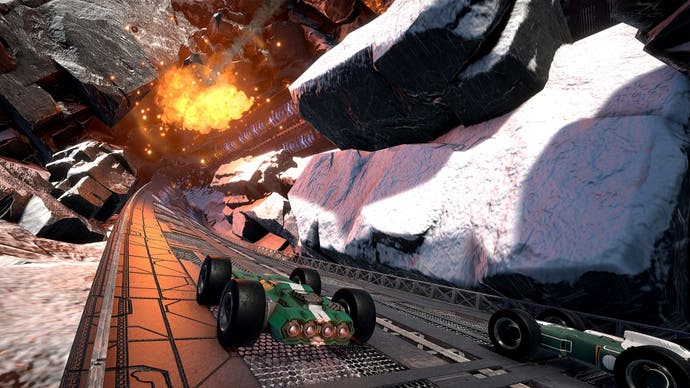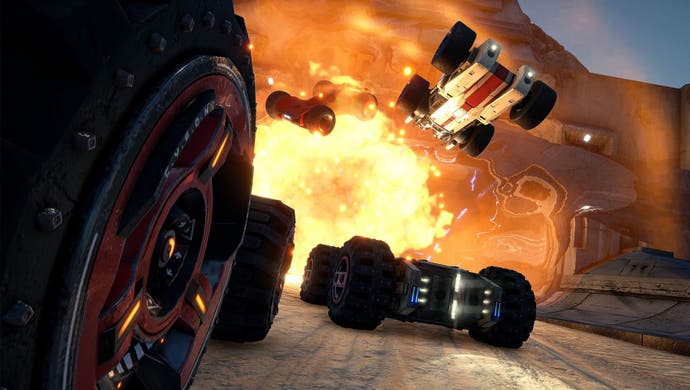Grip: Combat Racing review - unrefined tribute to cult racer Rollcage
Tyred and emotional.
It's a marvel of modern video game economics that 'spiritual successors' have gone from game-forum daydreams to a viable cottage industry. Fuelled by crowdfunding and early access schemes and by an ageing gaming population with strong nostalgic yearnings, this industry is ready to honour any dormant title that still stirs fond memories, no matter how obscure. Rather sweetly, it also sometimes brings the games' original creators back into game development after decades away.
That's the case with Grip: Combat Racing, a straightforward tribute to - not to say reincarnation of - Rollcage. Rollcage was a 1999 futuristic combat racer that followed in Wipeout's slipstream; it was published by Wipeout's developer Psygnosis and also featured racing at blistering speeds on stark, industrial offworld tracks, using Mario Kart-inspired weapons and driven by a propulsive drum-and-bass soundtrack. In place of Wipeout's sleek anti-gravity darts, Rollcage had chunky little tanks with enough downforce to drive on the walls and ceiling at speed, plus huge wheels that meant they could be flipped over and keep on driving. It was a less precise and more chaotic game than Wipeout; it had a good concept and could be a lot of fun, but there's a reason it hasn't lived as long in most people's memories. It was already something of a cover act back then.
It had its dedicated fans, though. Among them was a home renovator called Chris Mallinson, who noticed on a Steam group that Robert Baker, a former programmer with Rollcage's developer Attention to Detail, was still working to keep the game playable on modern PCs. As they revealed in a 2015 IGN interview, Mallinson pitched Baker a spiritual follow-up to the game they both still loved. They formed a studio called Caged Element and began work on Grip, which arrives on consoles today after a long spell on Steam Early Access, where it has been well received.
It's a feelgood story, especially for anyone who, like me, spent the second half of the 1990s in grotty living rooms with the curtains drawn, the PlayStation on and smoke in the air. Somewhat parochially, it's also nice to hear of developers like Baker who participated in the second Britsoft boom finding a way back to what they loved. But Grip is a tricky proposition to review, because, despite employing modern technologies, it is not even trying to be a modern video game. It is a recreation on current hardware of a game that was 15 years old when Caged Element started work and is almost 20 years old now. It's been made quite specifically for people who remember Rollcage, want it back, and don't really want it changed. And who am I to review those people's memories?
If you're one of those people: yes, Grip is the game you want it to be. It has the drum-and-bass soundtrack and the speed - it's very, very fast. It has the sense, when things are going well, that you are balanced on a precarious knife-edge of control and your vehicle could pinwheel out of your grasp with the slightest nudge off course, but it also has a feeling of robustness to the toylike cars that gives you confidence. It has power-up pickups and zip pads placed in cunning locations around the track to encourage you to rethink your racing line in three dimensions.
There are a few novelties. The Arena is a large open map to skid and leap around as you try to get a lock on your opponents in pure combat, with deathmatch and capture the flag equivalents. It can be quite fun, more so in multiplayer, but it's not what anyone came for. The are 'carkour' obstacle courses as well, but these just don't work. The game's physics and its vehicle handling are built around its core concept - doing 400mph on the ceiling - and don't adapt well to other scenarios.

I suspect diehard Rollcage fans will be willing to make allowances for Grip's lack of polish, and maybe that's fair enough. This is clearly an enthusiast, indie production with a niche audience, so a sort of homebrew feeling is appropriate. It really doesn't matter that the front end is scrappy and ugly. It's more of a shame that the audio is weak, which along with the visual effects contributes to an overall lack of feedback and impact. For a game in which physics plays such a large role, it's disappointing to be nagged by a sense of weightlessness and flimsiness.
There are minor balancing issues, too. The most frustrating of these to me was that the speed boost pickup is far more powerful than the on-track boosts, which skews the game's risk/reward balance away from using the latter. That seems a waste, since picking out the best line through the boosts when you are spinning around the inside of a cylinder, say, is one of Grip's most entertaining and unique challenges. But going for the generally easier-to-reach power-ups in the hope of a speed boost or a life-saving weapon pickup is almost always preferable, which begs the further question of why the track design so often asks you to choose between the two.
In the throes of a standard combat race, Grip has an overall tendency toward chaos over finesse, which is maybe how Rollcage was - I'll be honest, my memory of it is dim, must have been all that smoke. But it doesn't always make for the most satisfying racing game. At anything other than the easy difficulty setting it can be capricious indeed. To be fair to Caged Element, this is a very difficult balance to get right, and you can argue that only Nintendo in Mario Kart, and maybe Psygnosis in Wipeout, have ever perfected it. Despite these frustrations, the campaign mode is a decent way to while away a few hours, but it will be no surprise that Grip is more fun in multiplayer. On that note, Caged Element deserve special mention for going the extra mile and including the option for four-player split-screen - as is right and proper for a tribute to the era of "post-pub" gaming.

A note about formats: for this review, I played mostly on PC, where Grip runs fast and smooth, but I was also curious to check out the Nintendo Switch version. As it stands, I can't recommend it - the frame-rate is poor, the visual quality is low and although it is just about playable, it's not enjoyable at all. I am told a patch that improves performance is awaiting approval from Nintendo, and I've seen video footage of the game post-patch that does look better, but I've got no first-hand experience of it. Proceed with caution. (You can also argue that the presence of Mario Kart 8 on the system makes Grip entirely surplus to requirements - although Nintendo's classic is notably short on bangin' d'n'b choons.)
[Update 16/11/2018: I have checked out the day one patch for the game on Switch and it certainly has improved performance - framerate is stable, if not exactly fast. The visuals are still rather blurry. It's now a more playable version of the game, but still not a great one.]
You may have noticed that I've skirted the issue of whether Rollcage was really worth returning to in 2018, and whether non-fans will get anything out of Grip. That's because I suspect my answer is irrelevant: you either care, in which case Grip does just enough to fulfill your fantasy, or you don't, in which case it wasn't made for you.
I remember Rollcage, ish. I think I thought it was fun, but no Wipeout. Grip doesn't do anything for me. I'm glad it was made and that Mallinson and Baker and many other Rollcage fans have had their dream come true. But it strikes me as an unrefined throwback that recreates a cult game without asking how it might have evolved in the past couple of decades, or what it can bring to modern racing games that they have been missing since then. It's a time capsule, a way to step back into that smoky living room and close the door behind you. I had fun back then, but these days I'd rather leave the door open - I think we need the air.




